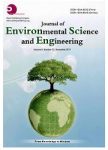Evaluation of the WEPP Model in a Belgian Agricultural Watershed
Evaluation of the WEPP Model in a Belgian Agricultural Watershed作者机构:Physical and Regional Geography Research Group Katholieke University Leuven 3000 Belgium University of Catania Department of Agricultural Engineering Catania 95123 Italy Department of Agro-Forest and Environmental Sciences and Technology Mediterranean University of Reggio Calabria Reggio Calabria 89122 Italy
出 版 物:《Journal of Environmental Science and Engineering》 (环境科学与工程(英文版))
年 卷 期:2011年第5卷第2期
页 面:184-198页
学科分类:0830[工学-环境科学与工程(可授工学、理学、农学学位)] 08[工学]
主 题:Watershed modelling WEPP water runoff peak flow soil erosion.
摘 要:The physically based WEPP (Water Erosion Prediction Project) model was implemented in a small agricultural watershed located in central Belgium, called Ganspoel. The watershed, mainly agricultural and resulting in a smooth topography, covers about 115 ha in a landscape typical of large parts of central Europe. Seventeen runoff, peak flow and sediment yield events, collected during a 2-year monitoring period, were simulated by the model. Even though the runoff volume predictions were well correlated to the corresponding observations, WEPP prediction capability was generally unsatisfactory also when different set-up methods of the soil effective hydraulic conductivity were used. The poor performance achieved for runoff volume and peak flow simulations affected sediment yield predictions. The differences between observed and simulated values for runoff, peak flow and sediment yield events may depend on: i) the great number of small runoff and sediment yield events within the available database with which is associated large natural variation and which in many cases are not well reproduced by WEPP; ii) the lack of model calibration processes; iii) the scarceness of information about some important soil physical and hydrological parameters; iv) the land use heterogeneity and crop schedule complexity of the Ganspoel watershed.



